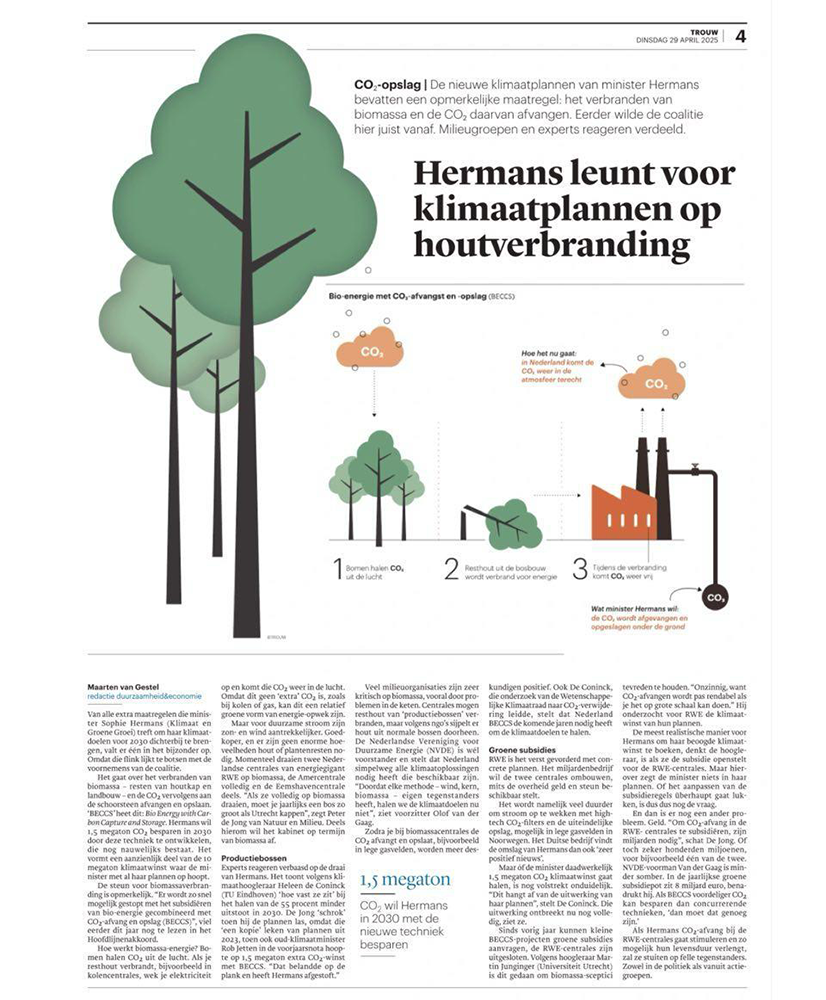One-sided article in Trouw about biomass and beccs does not do justice to the actual state of affairs
It is very good that the national newspaper Trouw pays attention to the remarkable choice of the Dutch Cabinet to invest heavily in biomass with carbon storage (BECCS) in an article by Maarten van Gestel today. It is problematic however that it is a very – one-sided – article that does not do justice to the actual state of affairs at the moment.

It is one thing to bring out the old acquaintances, a handful of biomass promoters that the cabinet repeatedly bases itself on (the so-called business, energy and climate ‘experts’ driven by commercial motives)* but that TROUW, with an emphatic image of ‘green and sustainable’, blindly adopts this rhetoric is questionable and raises questions.
Therefore, the following questions to TROUW:
- Why has TROUW chosen almost exclusively (with the exception of an argument from Natuur & Milieu about deforestation) to let the biomass lobby have its say?1
- Why has TROUW chosen to limit itself exclusively to CO2 emissions? In addition to the fact that the CO2 reduction of biomass (so-called zero emissions) and beccs (so-called negative emissions) claimed by the industry is not scientifically based and therefore nonsense – biomass emits more CO2 than coal and gas -, does biomass combustion also cause other harmful emissions such as (ultra)fine dust and nitrogen and other crucial arguments remain undiscussed?2
- Why has TROUW chosen an illustration that has clearly been edited? It concerns a selective and incorrect representation of reality. The many emissions (CO2 emissions) in the chain from logging (biomass) to storage (beccs) have been omitted. The biomass industry also uses this misleading image. But why Trouw? This is an adjustment of the original image see: comiteschonelucht.nl/averechtse-klimaatoplossing-en-valse-belofte-beccs
Finally,
- “Environmental groups & experts react dividedly” is the headline. Misleading, therefore, in the article only the so-called ‘experts’ have their say;
- A year ago, the Clean Air Committee already sent a contribution about BECCS to Trouw. The editorial staff initially rejected it with the message that BECCS was ”not something that would interest Trouw readers at the breakfast table”. After a conversation, at our request, with the then editor-in-chief, a conversation took place with the new head of the opinion editorial team and it was published after all.Since then, all critical contributions on biomass and BECCS have been categorically rejected. The renewed ignoring of critical arguments fits in with this policy, but raises questions about the importance of the newspaper. Nature is important, but commercial, political and industrial interests weigh more heavily in this dossier, otherwise? In any case, it is very worrying and problematic – especially in these times when the critical press is under pressure – when established press and media do not base themselves on impartiality based on balance (granting equal space to opposing opinions) and objectivity.
See Link:
www.trouw.nl/opinie/omgebouwde-kolencentrale-levert-niet-opeens-groene-energie-integendeel~b04bfc0c
Without paywall:
comiteschonelucht.nl/omgebouwde-kolencentrale
Article Trouw: https://www.trouw.nl/duurzaamheid-economie/om-klimaatdoelen-te-halen-leunt-hermans-op-omstreden-houtgebrand~be34177c/
- Copernicus Institute of Utrecht University; biobased industry, Dutch Sustainable Energy Association (NVDE); major user of biomass subsidies from the government (so-called Stimulation subsidies ‘Sustainable” Energy SDE) and TU Delft and Radboud University; the Energy and Climate Coalition. For more information about the biomass (+beccs) lobby, read the article in the magazine Milieu.
Conflict of interest biomass sharpens the relationships in the debate. Tijdschrift Milieu (2024) | “Biomass for energy: a good idea?”
With paywall:
milieu.vvm.info/milieu-2024-4-biomassa-voor-energie-een-goed-idee
Without paywall:
comiteschonelucht.nl/belangenstrijd-biomassa-zet-de-relatieen-in-debat-op-scherp ↩︎ - Such as the irreversible damage to forests & biodiversity by deforestation and clear-cutting of natural forests that are replaced by monocultures. This argument alone is a convincing reason to stop biomass. In other words, why are the most important critics of biomass and beccs from an ecological perspective from science (including the European Academies Science Advisory Council (EASAC) Louise E.M. Vet, Tim Searchinger) and society (Clean Air Committee) not allowed to speak?
For the full story with attention to all arguments about biomass and beccs see the link below, including the original and unedited illustration:
comiteschonelucht.nl/averechtse-klimaatoplossing-en-valse-belofte-beccs ↩︎
